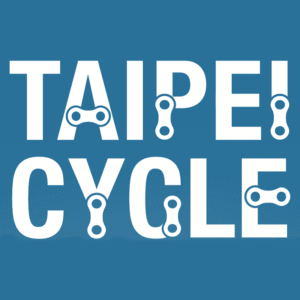The Taiwanese bicycle industry harbours grand ambitions to become more sustainable. In tough economic times, this goal is anything but simple. What influence does the downturn and other challenges have on sustainability investments?
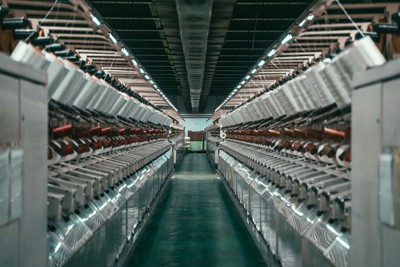
A small fibre with a big impact. In the glow of the camera, the Etycord fibres made by the Taiwanese company Formosa Taffeta (Hall 2 / S0224) in their factory close to Taichung, sparkle in a brown-orange hue. Yet, their effect on the bicycle industry is actually green. The reason is their environmental impact: Etycord is designed to drastically lower the CO2 footprint of bicycle tyres. To achieve this, Formosa Taffeta and parent company Formosa Chemical & Fiber Corporation recycle old ocean waste, turning it into nylon fibres which are then woven into tyre cords. “Etycord is currently our ‘hot topic’. We take sustainability very seriously and are very proud that the first industry players have implemented the material into their portfolio,” says Edward Lung. He is the sales and marketing representative for the tyre cord business division of Formosa Taffeta and one of the driving forces of his department when it comes to sustainability actions. “Last year, Taiwanese manufacturer Maxxis showed a tyre with our material at Taipei Cycle Show. This year, we will see a model from the German company Schwalbe,” he adds.

With their sustainability efforts, Formosa Taffeta lead a long list of companies from the Taiwanese bicycle industry that are working hard to become greener. The fact that climate and environmental protection are being taken increasingly seriously in Taiwan was already evident at many booths at last year’s Taipei Cycle Show. This year, efforts towards sustainability have accelerated even more, which is omnipresent in numerous product innovations and company initiatives showcased at the show. These efforts are also reflected by the decision of the trade show organisers from the Taiwan External Trade Development Council (TAITRA) to make sustainability one of the main themes of this year’s Taipei Cycle Show. “Sustainability is at the core of our values and vision for Taipei Cycle 2024, reflecting our dedication to fostering positive change within the cycling industry,” TAITRA spokesperson Ting-Yu Hsieh confirms. “The global community increasingly recognises the urgent need to address environmental challenges, and the cycling industry is no exception. Bicycles represent a sustainable mode of transportation that aligns with the broader goals of reducing carbon emissions and promoting eco-friendly mobility solutions,” she points out.
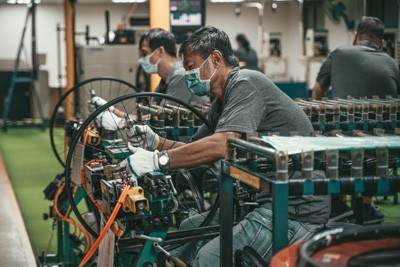
The most notable sustainability effort in the Taiwanese bicycle industry to date, however, has been spearheaded by market leader Giant, which is the promoter of the Bicycling Alliance for Sustainability (BAS). The goal of the organisation – which is strongly reminiscent of Taiwan’s former industry association A-Team – is to create a platform to interact, share ideas, and develop new ESG initiatives (Environmental Social Governance) to help the bicycle industry move towards more sustainable production practices. At the start, in autumn 2022, 33 companies had joined the organisation. Eighteen months later, that number has grown to 80 members. “At BAS, the different members work closely together and set common goals – for example, saving 25 kg CO2e per bicycle by 2040,” Jeff Chen explains. The General Manager of Taichung-based company Joy Industrial (Hall 1 / I0922) is Vice Chairman at the BAS. “The significant increase in membership clearly shows that investments in ESG are a top priority for many Taiwanese companies – even in economically challenging times,” Chen adds.
With his remarks, Chen addresses an issue that looms like a dark shadow over the bicycle industry’s green ambitions: the economic situation. Bicycle manufacturers worldwide are reporting declines in sales – often in the double digits. As the heart of global bicycle production, Taiwan is particularly affected by this financial downturn. In times when many factories are operating at only half capacity, and some companies even have to lay off employees, it begs the question of how these downturns in sales impact investments in the sustainability sector. Sandra Brandt, Executive Director of Shift Cycling Culture, a Dutch organisation aimed at accelerating collective climate action in the global cycling industry, confirms these speculations: “We are certainly seeing the influence of these current challenges on companies in terms of their sustainability efforts,” she says. “I would say that the current economic situation has further divided the industry into companies that view sustainability as a key strategy to building more resilient and successful businesses and those who see it merely as a nice-to-have marketing exercise. While some cycling brands are doing exciting things, others have put their sustainability journey on hold,” she points out.
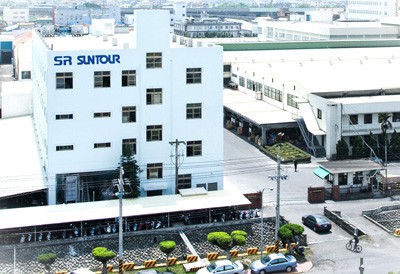
When speaking to different firms within the Taiwanese bike industry, this issue is not unfamiliar. “We see some companies struggling with low sales numbers, and some have to reduce their workforce, while others adjust their production schedules based on their orders. This, of course, affects their budgets. So, yes, I believe this is an issue,” remarks Joy Industrial General Manager Jeff Chen. He does, however, highlight the positive developments: “At BAS, we’ve managed to get 84% of our members to measure or start measuring their Scope 1 and Scope 2 emissions, which puts us ahead of our schedule. This indicates that things are definitely moving in the right direction – despite the challenges.” Tom Suenaga, Sales Development Director at Chang-Hua-based component manufacturer SR Suntour (Hall 1 / J0515), also observes the economic challenges when becoming more sustainable. “However, we recognise that companies cannot survive if they don’t pay enough attention to ESG or sustainability from now on. We must operate based on sustainable principles. Therefore, I believe continuous effort is essential for the next decades,” he says and also refers to the current company report. In the chapter “future prospects”, the report states: “Produce a stable profit and contribute to the prosperity of the local community as well as to the global community (sustainable, socially responsible, fair employment policy and fair production methods).
Beyond the economic challenges, Taiwanese bicycle producers are confronted with other significant hurdles in achieving greater sustainability, notably an increasing political pressure. While the Taiwanese government has set the goal of “net-zero” by 2050, the European Union’s forthcoming plans to introduce carbon tariffs on imports from 2026 on will have a big effect on the industry and underscore the increasing importance for exporters to monitor and actively decrease their carbon emissions. Although the last vote on the Corporate Sustainability Due Diligence Directive, which would have significantly tightened supply chain reporting, did not find a majority in the EU Parliament at the end of February, an in the future potentially stricter EU legislation could also mean that significantly more companies will be obliged to report on their and their supply chain’s sustainability measures, which will also affect overseas partners. As a result of this tightening political framework, Taiwanese firms are compelled to advance their sustainability strategies rapidly.
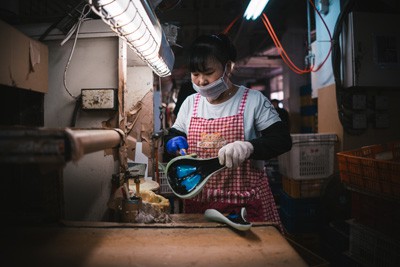
“To adapt all business operations is already a big task on its own,” confirms Ann Chen, CEO of Velo (Hall 1 / J0618). The saddle specialist from Taichung has invested heavily in greener production technologies and more sustainable product designs over the past few years and has also sought relevant certifications, notably ISO 14064 (quantification and reporting of greenhouse gas emissions). According to Chen, receiving the necessary certifications could become another challenge for many industry players, especially if a company starts too late with the process. “The bicycle industry is not the biggest industry. Some sectors have more resources, such as high-tech and semiconductor companies. And the capacities at the certification agencies are limited. This bottleneck could affect the bicycle industry in the long run,” she says, but simultaneously emphasises that the path towards more sustainability is irreversible. “In the future, it will be about being innovative, efficient, and more sustainable.”

Similar experiences are being reported by Nuvo (Hall 1 / J0828). The Changhua-based accessory specialist is currently building a new factory, intended to be the first fully sustainable factory in the bicycle industry. Therefore, the 230,000-square-foot factory has been designed in accordance with Taiwan’s EEWH certification (Ecology, Energy Saving, Waste Reduction, Health) sustainable building guidelines. The opening is planned for the end of this year. Marketing Director Amy Shih also reports that certifications take “very long due to the limited capacities of the responsible agencies”. Nonetheless, she warns that the bicycle industry must not lose sight of the long-term major tasks despite the current challenges. “Sustainability isn’t something you just do for a while and then stop. It’s a commitment,” she says and adds: “There’s a saying in Mandarin – 洗頭髮了就要洗乾淨 – which phonetically reads as “Xǐ tóufǎle jiù yào piǎo gānjìng”. This phrase emphasizes the importance of thoroughly rinsing and cleaning your hair after applying shampoo. It’s a metaphorical reminder to follow through and finish what you start, ensuring completeness and effectiveness in your actions. The same applies to sustainability.”From economic challenges and political pressure to organisational bottlenecks – sustainability expert Sandra Brandt from Shift Cycling Culture is convinced that, despite the many hurdles, the commitment to sustainable business practices will pay off in the long run: “Continuing with business as usual is a dead-end road. Adopting long-term sustainability strategies is crucial to building business resilience and unlocking opportunities. It helps companies to build an operating system that allows them to manoeuvre through current and future challenges. And it offers tremendous opportunities for innovation, competitiveness, and new growth,” she says. Edward Lung from tyre cord specialist Formosa Taffeta shares similar thoughts. He aims to take a significant step towards greener bicycle tyres with the green Etycord material at this year’s Taipei Cycle Show. “Despite the current challenges, I think more and more companies will launch ESG-related products. This is also the feedback we receive from our partners. We see no signs suggesting a slowdown regarding sustainability efforts – it’s more the opposite.”


